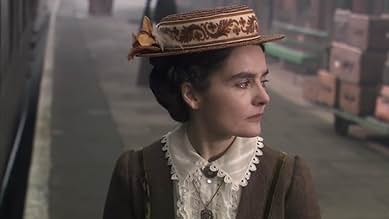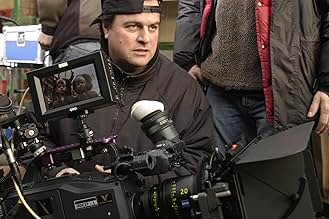This docudrama examines the history of scientific discovery that lead up to Albert Einstein's famous equation E=mc2 and its aftermath in the creation of nuclear energy. This includes Faraday... Read allThis docudrama examines the history of scientific discovery that lead up to Albert Einstein's famous equation E=mc2 and its aftermath in the creation of nuclear energy. This includes Faraday's discovery of electromagnetic fields; Antoine Lavoisier's discovery that mass is never l... Read allThis docudrama examines the history of scientific discovery that lead up to Albert Einstein's famous equation E=mc2 and its aftermath in the creation of nuclear energy. This includes Faraday's discovery of electromagnetic fields; Antoine Lavoisier's discovery that mass is never lost; and Emilie du Chatelet's demonstration that Newton's calculation of the velocity of a... Read all
- Director
- Writers
- Stars
- Humphry Davy
- (as Sam West)
- Professeur Fritz Muhlberg
- (as Mike Sarne)
- Director
- Writers
- All cast & crew
- Production, box office & more at IMDbPro
Featured reviews
But enough of all those things. For as long as I remember, Albert Eistein was this slow-learner as a child but then went on to achieve later in life of what is probably one of the world's most famous equation in the history of science.
So imagine it was a real eye-opener to me as to how he really got his equation as I watched the show. It was pretty amazing that learning from what others did, he improved on it and it eventually led to the equation all of us knew since. As my knowledge on physics is very basic, it can be a little hard just to read the dry texts on my past Physics textbook. But when this was aired some time back here, it was something I so want to watch. Though I never study in my Physics syllabus about the famous equation, I had learnt and heard about its legacy to the world nowadays through my father who is more aware of it. It was mentioned on the show too.
Other than how Eistein got the equation, it even touched about his private life as well. Another aspect where it opened my eyes as well.
My final say? It's just basically what I had given the title to this review.
Later light is found to be of the same properties of electricity and magnetism. Other, more elemental discoveries, would prove to be instrumental to help Einstein bring all of this together to figure out the mechanics of how the sub-molecular forces which allow everything in existence to thrive.
Without one piece of this puzzle, people would have never have been able to realize how things work.
This is the first report as to how to we came to understand the Universe and utilize its properties.
As for the problem of rewriting history in order to assuage minorities, well, I understand Mr. Tarmcgator's taking issue in this case with the (possibly) fallacious reinvention of female scientists' roles in order to encourage young women of today to go into the sciences. I think we would be far better to discuss the possible reasons that young women are not going into or staying in the sciences as readily as men. This, however, is the one of the "giant" questions that we so far cannot answer - just seeing the reaction to Harvard president Lawrence H. Summers' speech last year (http://www.president.harvard.edu/speeches/2005/nber.html) is evidence of that (as an aside, I'm not about to say that he was horribly misguided in the questions he posed, which I think need badly to be discussed, but that perhaps - as has been widely suggested, in fact - he jumped to conclusions regarding the supposed greater weight of the role of genetics when comparing the sexes' abilities in mathematics).
No, I do not want to be lied to about women's roles in history (however dreary and depressing they usually turn out to be), but to quote you: "Emilie du Châtelet was no doubt a brilliant woman who tried to make the most of the limited intellectual opportunities that women could pursue in early 18th-century France; but one wonders how much more influential she was on the course of the development of physics than, say, Newton or Leibniz." One wonders indeed, sir; unfortunately, we will never know how great she would have been had she had the chance to attain the same education and encouragement as her male peers. All other things being equal, why couldn't she have been as great a mind as Newton or Liebniz? I, as a woman, was inspired by "E=mc²" to hope that she could have been. The authors seem to be attempting to give her this due, and perhaps in exaggerating the role that she did have, they are merely paying homage to the role she might have had, had she not been a prisoner to the time in which she lived. Can you honestly begrudge them this effort?
What is it about? Well, it is not a biography of Einstein, as the title might make you think. It is a history of the idea of E=mc2 and where is came from. Einstein is just a cog in an angrenage of people that made it possible.
What is even better is that the science is made accessible and not just story told. It was a small revelation, but a revelation nonetheless, when the narrator asked "if you put pore energy into the movement of an object it moves faster, but it cannot move faster than the speed of light, no matter how much energy you put in. WHERE does the energy go?" and I finally understood why things have to get heavier as they reach the speed of light.
As for the role of women as brainy visionaries, why not? As long as the story is accurate, the empowerment of women as a byproduct is irrelevant.
Did you know
- TriviaThe movie was made to commemorate the 100th anniversary of the publication of Albert Einstein's paper in which he first outlined the theory of relativity.
- ConnectionsFeatures Nova: E=mc²: Einstein's Big Idea (2005)
Details
- Release date
- Countries of origin
- Official sites
- Language
- Also known as
- Великая идея Эйнштейна
- Filming locations
- Production companies
- See more company credits at IMDbPro































